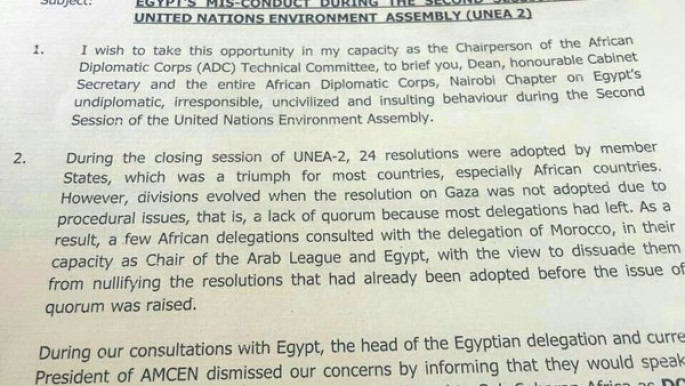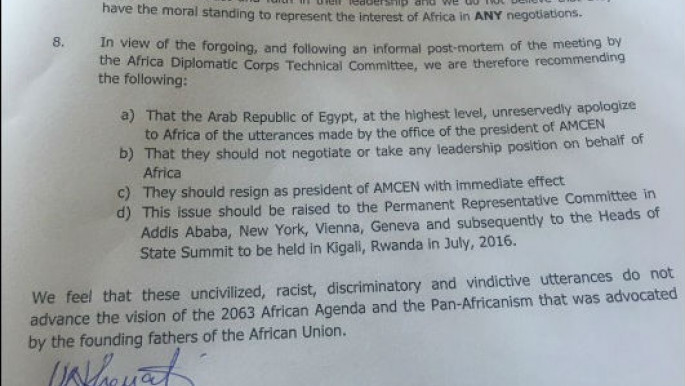UN: Egypt's delegate calls fellow Africans 'dogs and slaves'
Details of the incident have emerged after Yvonne Khamati, chair of the Africa Diplomatic Corps, wrote a memo on May 29 to the dean of the body requesting that Egypt be barred from representing Africa in any official capacity until it issues an apology.
"We feel that these uncivilised, racist, discriminatory and vindictive utterances do not advance the vision of the 2063 African Agenda and the Pan-Africanism that was advocated by the founding fathers of the African Union," Khamati said in a press statement.
"This issue should be raised to the Permanent Representative Committee in Addis Ababa, New York, Vienna, Geneva and subsequently to the Heads of State summit to be held in Kigali, Rwanda in July 2016," she continued.
According to the memo, the incident occurred after resolutions on Gaza were not adopted after most of the delegates left the meeting.
Following this, the head of the Egyptian delegation, and sitting president of the African Ministerial Conference on the Environment (AMCEN), "referred to sub-Saharan Africa as dogs and slaves, in Arabic", Kenya's Khamati wrote in the memo.
She also called for the minister's resignation as AMCEN president "with immediate effect".
 |
 |
| The memo submitted by Khamati on Sunday [Twitter] |
While the document did not name the accused, Khamati posted on Twitter that the words were uttered by Egypt's environment minister, who is listed on the United Nations Evironment Programme's website as Khaled Fahmy, current AMCEN president.
In response to questions from social media users, Khamati also indicated that the words were not a slip of tongue, but rather were only meant to be understood by the Egyptian delegation as they were spoken in Arabic.
Twitter Post
|
She explained on Kenya's Capital FM radio station that some of the non-Arab delegates had understood the AMCEN president's slur, as they had learned Arabic during time served in the Middle East.
Cairo rejects claims
Egypt's foreign ministry said on Tuesday that although it was conducting an investigation, there were no confirmed reports that the utterances were made.
"In any case, it is not acceptable to level flimsy accusations against the Egyptian state and Egypt's people, casting doubts over their African affiliation and Egypt's ability to shoulder its responsibility in expressing African interests," the ministry added in a statement.
Khaled Fahmy has also denied being present at the meeting, saying that his country was represented by its ambassador to Kenya and two environment advisers.
"No Egyptian member could make such utterances," Fahmy also said in remarks to the press.
Social media storm
African social media users have taken to Twitter and Facebook to express their disgust at the remarks.
"I'm not shocked. I was there back in 2002. The racism I witnessed against Black Africans was quite open TBH," wrote Kenyan Twitter user Riaz Gilani.
Others questioned Egypt's status as an African country, with one person tweeting, "this speaks to the North-South divide in the continent; where the north's African status is debated."
Meanwhile, Egyptians have also gotten behind their keyboards to apologise for the remarks and to assert their love for the continent.
"As a proud Egyptian who grew up in Kenya, Botswana & SA allow me to dissociate us from 'our' unrepresentative representative," tweeted Mojo Shehata to Yvonne Khamati.
— Mojo (@MojoShehata) May 31, 2016
" style="color:#fff;" class="twitter-post-link" target="_blank">Twitter Post
|
"Believe me, all Egypt people will talk about what happened and sorry again," wrote another user.
As part of the memo, some African members of the UNEP demanded that the issue be raised at the African Union Kigali Heads of State Summit, which is scheduled for July 12-13.
Egyptian President Abdel Fatah al-Sisi will be in attendence at the summit in Rwanda's capital, and may have to address the matter personally if the dispute is not resolved by then.



